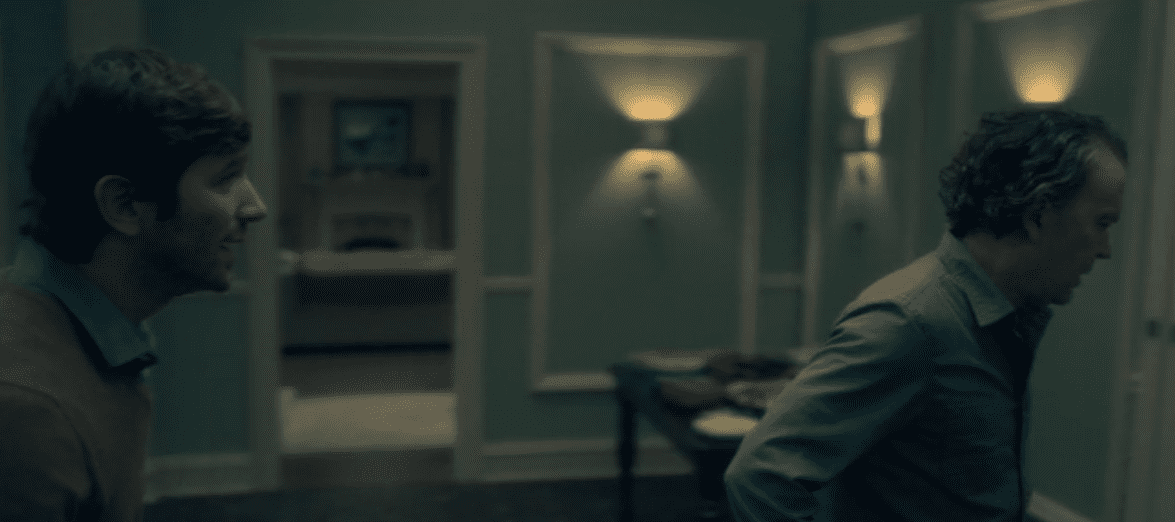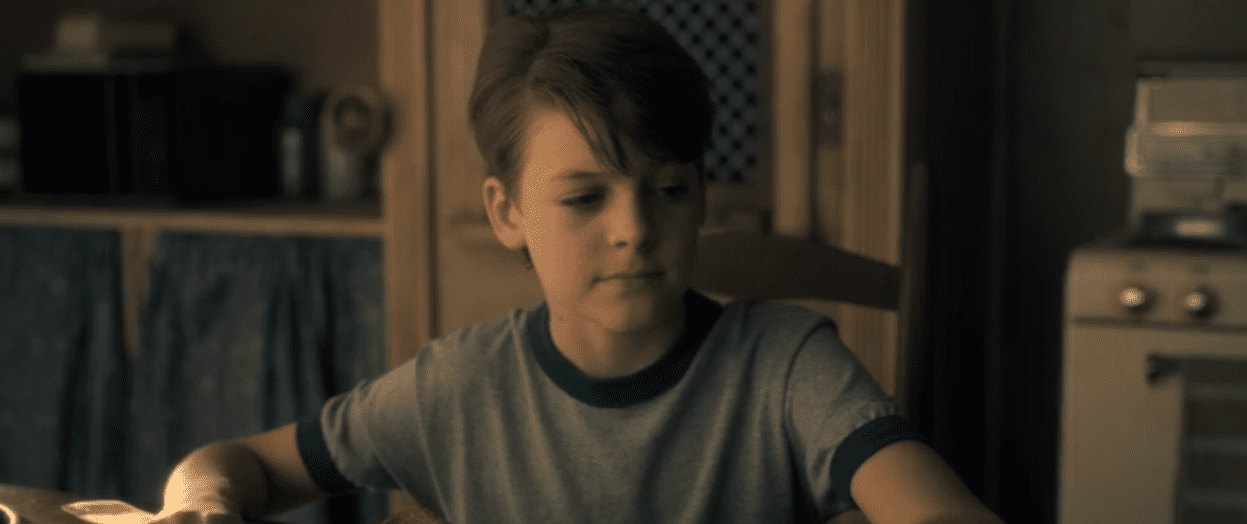One of the most chilling and talked-about series to hit our screens this year is The Haunting of Hill House. Our writers have decided to turn over a few rocks and do some digging with in-depth profiles of the main characters in the show. Who knows what they might discover? So, draw the curtains, turn out the lights, and tuck in for Part One of Five in 25YL’s look at the Crain siblings from The Haunting of Hill House, as Caemeron Crain (no relation) discusses Steve.
For most of the series at least, Steven Crain does not believe in ghosts. Instead, he chalks up all of the ghost talk in his family to mental illness: his mother (Olivia) killed herself, his father (Hugh) talks either to himself or someone who isn’t there, his brother (Luke) is a heroin addict, one of his sisters (Theo) wears gloves all of the time, while another (Nell) went off her meds and committed suicide as well…and then there’s Shirley, who may not tend to suffer from delusions but whom Steve clearly thinks is neurotic. She’s overly uptight about his book, and there is the fact that she chose to deal with dead bodies for a living; whatever that might say about her.
In contrast, Steve views himself to be soberly realistic. Fearing that the mental illness that runs in his family has a genetic basis, he goes so far as to have a vasectomy. He will not procreate and pass this on. Telling the ghost stories, on the other hand, is something he is open to; what harm could they do to the sane, after all? His novels were flops, but this book about Hill House is a hit. And, while Shirley may have a point in calling it exploitative, this was his life too that he wrote about.
Ghosts aren’t real. You all are mentally ill. Steven may conceive of himself as scientific on this front, but to what extent is he actually denying the reality of mental illness? The ghosts may be real in this story, but that doesn’t keep them from—in many ways—standing in for the demons that may haunt us in real life. In this regard, Steven’s “realism” is reductive—he fails to appreciate the reality of what afflicts members of his family.

Steven’s argument with his father in “Two Storms” comes to head as the latter insists that the former doesn’t know what happened the night that his mother committed suicide. They had been arguing about whether ghosts are real, but Steven’s response to this cuts like a knife—“the wrong parent died!”
I don’t know if one could say something more hurtful to one’s father, but I do know that Hugh probably agrees, at least on some level. This isn’t the kind of sentiment that is based on a sober line of reasoning; it’s emotional all the way down. Losing one’s mother at a young age isn’t the kind of thing one gets over; it creates a certain kind of pit of sorrow in the soul that’s always there. And when your father is—let’s be honest—a bit of a f*ck-up, who can’t even manage to take care of you after you’ve both experienced this incredible loss (instead leaving you to be raised by another relative), it can be hard to resist the anger. It can feel as though you’ve been abandoned by both parents, even if that isn’t fair.
Of course, it wasn’t suicide or poltergeists that took my mother (it was the cancer), and my father wasn’t haunted by ghosts so much as by a more mundane kind of spirits, but I didn’t realize just how much I could relate to our friend Steve Crain until I started seriously thinking about what I would say here. I, too, lost my mother at a young age. I, too, had a father that wasn’t there. And I, too, went to live with another relative. And the fact that the kids in this story share my last name is, well, just kind of weird.
It is clear to me, though, that this is Steven’s core trauma: his mother died, and his father left him. And, at an emotional level, it doesn’t matter if either had a choice.
In the scenes of him as a child, we see Steven eager to help his father, and to please his mother. One scene in particular, in which Mrs. Dudley asks the young Steve if knows the gospels, stands out. Olivia steps in to inform her that he is not only familiar with the New Testament, but other religious texts; also Shakespeare, because “there are more things in heaven and earth, Horatio, than are dreamt of in your philosophy.”

It is almost a bit too on the nose in terms of a thesis statement for the series, but it serves as such nonetheless. There are things that we don’t understand, as much as we might like to think that we do, scientifically. And, in a meaningful way, mental illness is on that list. We might be able to treat schizophrenia, for example, in ways that help people, but we don’t truly grasp what it is, what causes it, or know how to “cure” it.
Indeed, mental illness is not something we cure so much as learn to live with. As Steve insists throughout the series that this is what his family members are suffering with, as opposed to real ghosts, we should perhaps bear in mind the extent to which mental illness itself is often viewed as less than real; as though it were just something in the sufferer’s head, or some kind of moral failing.
It is true that the ghosts in Hill House are real (in terms of the narrative), but that doesn’t keep them from symbolizing the very real struggles that many of us face: depression, addiction, paranoia, dissociative disorders, etc.
Steve’s tendency to deny the reality of the ghosts could then be seen as representative of the all too real tendency to deny the reality of these kinds of issues. Take, for example, the way he cajoles himself to keep it together when he sees Nell’s ghost in the funeral parlor. He’s denying the reality of the situation; refusing to grapple with it.
And then there is his book about Hill House, which (as Shirley notes) feeds into the very beliefs about the place that Steve insists on denying. How do we explain the fact that Steven wrote it, other than as a money grab? He does say, after all, that his novels weren’t selling, and it seems that the money he got from the Hill House book was good.
Perhaps this is all that it is—Hill House is a story he has to tell that can make him a buck—but we might view his move more sympathetically by thinking of it as an attempt to work through the trauma of his mother’s death. How does one make sense of such a thing?
Hugh makes sense of it through an appeal to ghosts, but that isn’t an option that’s on the table for Steven (at least for most of the series). No, he is too rational for all of that. His younger siblings thought they saw things in a big, spooky house, but it was just a big, spooky house, and that makes sense of that. His father made claims about the place being haunted after his wife killed herself, but that must just be because he couldn’t deal with the fact that she did, and with his own potential culpability in not seeing it coming.
Yet, this is the drama of Steve’s life, and presenting it in the form of a book laden with narratives pertaining to ghosts he doesn’t believe in is still to present it. And he can recognize the value of such a framing device. Is he exploiting the woman whose house he visits in the first episode, or does he truly think he will be honoring her husband by writing about him, even though he doesn’t buy into the ghost stuff? I tend to think it is, in fact, the latter. After all, when he is writing the follow-up in his fantasy sequence in the last episode, he doesn’t even intend to publish it.
Steve is the oldest brother and thinks of that as bringing with it a responsibility. He tells Luke—both in the past and the present—that he’s got him, and that they’ll get through this. But when they approach Nell’s casket, it is not Luke, but Steve, that breaks down. The trauma of losing his little sister resonates with that of losing his mother, and he couldn’t save either of them.
I don’t remember much of my own mother, but I do distinctly recall a time when we came back from the grocery store and she lay down on the couch, lamenting that she hadn’t waited for my dad to help her carry things in. I was all of three years old at the time, I suspect, but I felt guilty that I couldn’t help. I wanted to help, but I couldn’t. There was nothing I could have done to keep her from dying.
There was nothing Steven could have done, either; nothing Hugh could have done. The ghosts are real, and sometimes they take those we love away from us. At least by the end of the series, it seems that Steven has stopped denying that.
Catch up with our overview of The Haunting of Hill House from last week, and come back next week for Part Two: Shirley.

